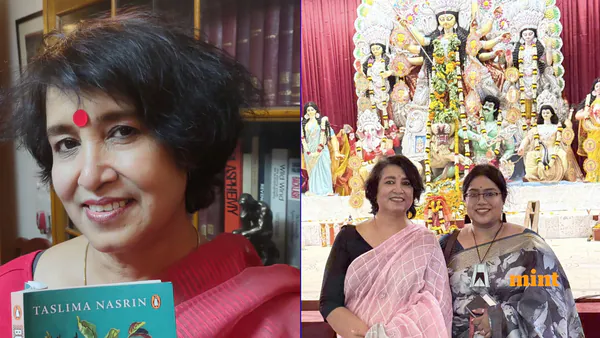
'Bengali Muslim Culture Rooted In Hindu Tradition': Taslima Nasreen While Sharing Durga Puja Pandal Photo
Taslima Nasreen, a Muslim by birth and atheist by choice, is widely known for criticising Islamic fundamentalism. She, however, insists that she opposes all forms of religious extremism and patriarchy.
Taslima argues in her post that Bengalis, regardless of their religion, share a cultural identity rooted in Hindu traditions. According to her, even Bengali Muslims cannot claim their culture comes from Arabia.
Also Read | Bangladesh security forces target Hindus, Taslima Nasreen shares video“Even if a Bengali is Muslim, his culture is not the culture of Arabia. His culture is Bengali culture, and that culture is rooted in Hindu tradition,” she wrote.
“The beating of drums, the music, the dance-these are the primal expressions of Bengali culture. This is what it means to be Bengali. To deny it is to deny oneself,” she added.
Her Twitter (now X) post attracted many comments. One of those came from Javed Akhtar. The celebrated poet-writer responded by praising Bengali literature and culture. However, he believes people should also respect the Ganga-Jamuni tehzeeb of Awadh.
Akhtar points out that Awadh's traditions reflect Persian and Central Asian influences absorbed in Indian terms, not Arab culture.
“BTW many Bangali surnames are in Persian,” Javed Akhtar added.
Also Read | Javed Akhtar shuts down troll on Independence Day: 'Apni aukat mein raho'Taslima replied that, while Persian words had entered Bengali during the Sultanate and Mughal periods, most of the language came from Sanskrit and Prakrit. While acknowledging Persian, Arabic, Turkic, English, Portuguese, Dutch and other influences, she calls Bengali culture“shaped for centuries by Hindu traditions”.
“Cultures from Persia, Arabia, Central Asia, and later from the West have certainly influenced Bengali culture. Yet Bengali Hindu traditions remain dominant. Our music, dance, food, and clothing are still largely rooted in Hindu practices, even though these traditions have evolved considerably over time,” she added.
Taslima Nasreen controversiesTaslima Nasreen's novel Lajja was banned in Bangladesh in 1993. It sparked violent protests and charges of blasphemy. In India, her autobiography Dwikhandito was banned in West Bengal for allegedly hurting Muslim sentiments.
Also Read | 'India is my 2nd...': Author Taslima Nasreen appeals to Amit Shah 'let her stay'During her career, Taslima has faced multiple lawsuits, censorship demands and repeated death threats. Fatwas and assaults forced her into exile first from Bangladesh, later from West Bengal.
Her outspoken views have offended religious leaders, politicians and even writers across South Asia. Since 2011,
Taslima Nasreen has been living in Delhi. In 2024, she received an extension of her long-term residence permit from the Indian government.
“A world of thanks,” wrote the author while tagging Home Minister Amit Shah.
Legal Disclaimer:
MENAFN provides the
information “as is” without warranty of any kind. We do not accept
any responsibility or liability for the accuracy, content, images,
videos, licenses, completeness, legality, or reliability of the information
contained in this article. If you have any complaints or copyright
issues related to this article, kindly contact the provider above.

















Comments
No comment